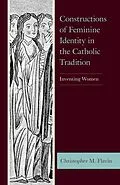Constructions of Feminine Identity in the Catholic Tradition examines the ways in which late classical medieval women's writings serve as a means of emphasizing both faith and social identity within a distinctly Christian, and later Catholic, tradition, which remains a major part of the understanding of faith and the self. Flavin focuses on key texts from the lives of desert saints and the Passio Perpetua to the autobiographies of Counter-Reformation women like Teresa of Ávila to illustrate the connections between the self and the divine.
Autorentext
Christopher Flavin is associate professor of English and chair of the department of languages and literature at Northeastern State University in Oklahoma.
Klappentext
Christopher M. Flavin examines the ways in which late classical medieval women's writings serve as a means of emphasizing both faith and social identity within a distinctly Christian, and later Catholic, tradition, which remains a major part of the understanding of faith and the self. Flavin focuses on key texts from the lives of desert saints and the Passio Perpetua to the autobiographies of Counter-Reformation women like Teresa of Ávila to illustrate the connections between the self and the divine.
Inhalt
Introduction
Chapter One: Women Writing or Writing About Women
Chapter Two: (En) Gendering Texts: The Establishment of Women's Christian Literary Traditions
Chapter Three: Perpetua and Her Daughters: Mystics, Mothers, Martyrs, and Texts
Chapter Four: Constructing a New Self: Women, Truth, and the Rhetorical Turn of the Twelfth Century
Chapter Five: Heloise and the Rhetoric of the Self
Chapter Six: Texts Without Bodies, Churches Without Windows: Affective Piety in Women's Autobiographies
Chapter Seven: Reinvigorating the Traditions: St. Teresa and the Reformation
